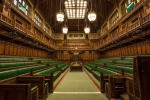
Fisheries
Fisheries was front and centre in Parliament recently as I welcomed the package of three fisheries consultations launched by DEFRA. The first is on strengthening the economic link for English licensed fishing vessels, to help ensure economic benefits for many of our coastal communities, including plans for an increased landing requirement of up to 70% into UK Ports; this is great news for many people in North Cornwall. The second consultation is on proposals for how the new fishing opportunities that the UK secures in negotiations will be split between Scotland, Wales, Northern Ireland and England in a way that is fairer and much more profitable for fishing communities across our four nations. Finally, I congratulated the Department on its proposals for how England’s share of those new opportunities will be distributed across communities. I hope that we will see greater benefits for many of our coastal communities and our hard-working fishermen and fisherwomen.
Concerns have been raised over the past few weeks that the ‘scallop wars’ we saw a couple of years back in the English Channel seem to be restarting, with many of our boats being targeted by the French. There is concern in the fishing community in Cornwall that, as we get to the crunch point in negotiations, much of their gear might be towed off and dragged due to the realisation that, if we do not reach a deal, there might be challenges for some continental fishermen.
I also want to talk about recreational angling. I am hopeful that we might reach a point where we have a catch-and-release bluefin tuna fishery around the coast of the country. I am grateful for the work that DEFRA is doing with the Angling Trust on developing a vision statement for recreational angling in the UK. The Government know that I have the ambition to create a world-class fishery and wide recreational opportunity for fishing off the North Cornwall coast.
I have heard on many doorsteps in North Cornwall that we need to repatriate our territorial fishing waters, which were sacrificed on the altar of the Common Fisheries Policy as we entered the European Union. The Government must continue to be robust in the trade negotiations, and they will continue to have my full support.
Productivity
Cornwall is recognised as having the lowest productivity rate in the UK. According to Office for National Statistics figures released in February 2019, it was 32% below the national average. Let be very clear, the rural productivity gap is in no way the fault of hard-working people in all our community, but the result of a combination of geographical and historical factors. I am committed to addressing that long-standing injustice.
First, it is worth examining some of the reasons the productivity gap exists and what we can do to address it. In terms of local government and national Government, local government officers and UK civil servants are bound to a funding formula for infrastructure projects that means they must seek best value for money. That has led to money being funnelled into already affluent areas, and, on paper, they see a greater return on that investment. However, that compounds and further widens the productivity gap we are here to discuss today.
The first step on the road to levelling up the United Kingdom would be to change that model, recognise the potential value of investment for a specific area and establish how much improved value there would be over the baseline. For example, to get a 1% improvement in London’s economy, we would have to invest tens of billions of pounds, but a 1% investment in the Cornish economy would exponentially increase productivity in the area.
On education, for far too long, young people in North Cornwall have accessed higher education outside the county. Once they have qualified, the majority never return home. Many are old school friends of mine, who sought better paid work in other places around the country.
I am pleased the Government are offering more vocation-based skills learning and degree-level apprenticeships. I hope we can do more to improve the life chances of young people in and around the country. In North Cornwall, our offer for young people has drastically improved. Callywith College in Bodmin was recently rated outstanding in six areas by Ofsted. I look forward to working with the college and expanding its future offer.
Moving on to health outcomes, the physical distance that some people must drive to visit GPs and cottage and general hospitals often means that more people live with conditions and must undergo lengthy surgery for treatment. They often rely on family members for that travel. For example, someone living in Bude in my constituency who has an appointment in nearby Barnstaple’s hospital might have to take half a day’s holiday from work just to run their relative to an appointment. That obviously has negative impacts on workplace productivity, but also on quality of life. The pandemic has proved that digital appointments with GPs can work, and some consulting can work. Further digitalisation of the NHS could mean rural and coastal communities accessing some of the best medical expertise in the country over Zoom or Skype without the need to travel vast distances.
Housing
I recognise that the building of homes is one of the biggest domestic issues facing our country and I am unashamedly pro-home ownership. A large contingent of people in North Cornwall are stuck in the rental trap, and I want to be able to provide them with the opportunities that many other people in the UK already enjoy. Although there is a legitimate debate to be had about housing numbers, the much wider issue is about the tenure of those homes and where they are built.
For years, we have seen a planning system that has been far too rigid, a lack of adequate and appropriate land coming forward, and huge disparities in the way applications are being considered, not only between different authorities, but within individual planning departments. We must recognise the inadequacies of the current system. Houses being built predominantly by large house builders puts huge pressure on local services immediately. Now, there is little involvement for small and medium-sized builders in the planning system. We are faced with constant section 106 delays, which help no one and delay the building of affordable housing.
Although there are some challenges within the White Paper, I broadly welcome the idea of highlighting areas for growth, renewal and protection. I also recognise the need for local authorities now to engage with town and parish councils to bring forward land for development and areas for protection. We recognise the challenges in Cornwall, which relate to people getting deposits; people being stuck in the rental trap; the cost of land; the lack of land; and the lack of housing opportunity.
What do I want to see in the planning Bill? I know that the Minister probably has not heard that he has not been ambitious enough, but on self-build I encourage him to go further. We have an opportunity to get serviced plots in some of these areas where people do not have ownership of any land or housing. Why not give young people in Cornwall the opportunity to be able to build their own home? The Government has done an excellent job in bringing forward 30% discounts for key workers, and for local people in communities such as North Cornwall. For the first time in many years, we are able to see a design guide in Cornwall, since the abolition of the district councils, there has been no design guide, and we have seen, identical houses that are all standard and no character. Let’s build back better in every sense of the word.
As always if I can help you during this difficult time please do not hesitate to get in touch via [email protected]. My office will also be happy to arrange a virtual MP surgery, either online or via the phone on 01208 74337.


